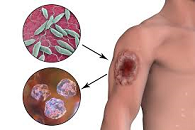Leishmaniasis patients in Eastern Africa may soon benefit from a new drug set to be developed by collaboration of Novartis, one of the biggest pharmaceuticals company and the Drugs for Neglected Diseases initiative (DNDi), a not-for-profit research and development organization.
The two sides have signed a collaboration and license agreement last month to jointly develop LXE408, as a potential new oral treatment for visceral leishmaniasis, one of the world’s leading parasitic killers. “DNDi’s desire is to work together with its partners (such as Novartis) to ensure that an effective treatment can be provided at an affordable price to those who need it most. DNDi and partners will need to carry out Phase II and Phase III clinical trials with representation from the different endemic countries in Eastern Africa. It is important to undertake both phases of the study to ensure that the treatment is safe and effective for leishmaniasis patients,” DNDi said in a statement.
LXE408 is a first-in-class compound, discovered at Novartis with financial support from the Wellcome Trust. Within the scope of the agreement, Novartis is responsible for completing Phase I clinical trials. In addition, it will drive pharmaceutical development and regulatory submissions. Upon approval, Novartis has committed to distributing the drug on an affordable basis worldwide with a focus on maximizing access in endemic countries.
It is indicated that the studies are set to begin in 2021, and the process will take at least 5-7 years. Reports show that Eastern African countries such as, Ethiopia, Kenya are among the highly affected countries by the parasitic killer with tens of thousands of leishmaniasis patients. Transmitted by the sand fly, leishmaniasis, also known as kala-azar, affects over one billion people; visceral leishmaniasis, the most serious form of the disease, affects an estimated 50 000 to 90 000 people per year.
Treating the disease is complex as it is dependent on the species of infecting parasite and the country, as treatment responses differ from region to region. “Novartis has a long-term commitment to neglected tropical diseases that spans several decades. Diseases caused by kinetoplastid parasites, such as leishmaniasis, are one of our strategic research priorities and, together with our partners, we have developed a promising portfolio of drug candidates,” said Dr Lutz Hegemann, Chief Operating Officer for Global Health at Novartis.
It is stated that DNDi will conduct a series of consultations which includes stakeholders, WHO and ministries of health from the most affected countries to define the target product profile, including a comprehensive discussion on affordability.
“Existing treatments for visceral leishmaniasis are simply not good enough. They are too long, increasingly ineffective, and can be toxic, painful, and costly,” said Dr Bernard Pécoul, Executive Director of DNDi. “Our hope is to radically transform this by developing new oral drugs that are affordable, safe, effective, easy to take, and can also be adapted to meet the treatment needs of patients in different countries.”
The collaboration between DNDi and Novartis is aligned with a broader program with Wellcome and other partners to develop new combinations of entirely new, all-orally acting chemical entities, to treat visceral leishmaniasis and cutaneous leishmaniasis, another form of the disease.
The program brings together a strong consortium of R&D partners, including the University of Dundee, GSK, Pfizer, TB Alliance, and Takeda Pharmaceutical Company Limited. These partners have built a portfolio of lead series, pre-clinical and clinical drug candidates, originating from different chemical classes with different mechanisms of action against leishmania parasites.

